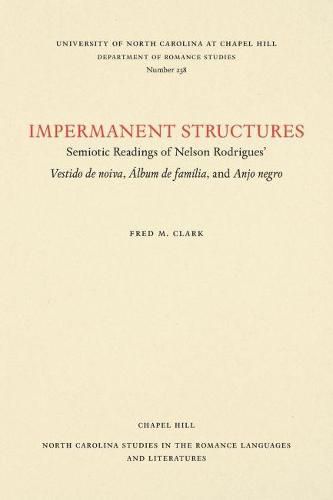Readings Newsletter
Become a Readings Member to make your shopping experience even easier.
Sign in or sign up for free!
You’re not far away from qualifying for FREE standard shipping within Australia
You’ve qualified for FREE standard shipping within Australia
The cart is loading…






Fred M. Clark offers a semiotic analysis of three plays by Nelson Rodrigues, based in Charles S. Pierce’s triadic concept of the sign: as sign, interpretant, and object, in regards to its production as perception and consciousness. Clark’s use of this triad approach demonstrates the self-conscious plays of icons in Vestido de noiva, Album de familia, and Anjo negro, and offers a basis for the relevance of his conclusions to theatre at large. Based on this semiotic theory, Clark demonstrates the particular modes in which Nelson’s theatre builds up fictional situations that transcend the pretense of the vanguard to become radically innovative and achieve a first-rate literary realization, equal of any occidental writer of the period. The author demonstrates the way in which Rodrigues dissects the difference between seeming and being, questioning the very notion of permanence and order.
$9.00 standard shipping within Australia
FREE standard shipping within Australia for orders over $100.00
Express & International shipping calculated at checkout
Fred M. Clark offers a semiotic analysis of three plays by Nelson Rodrigues, based in Charles S. Pierce’s triadic concept of the sign: as sign, interpretant, and object, in regards to its production as perception and consciousness. Clark’s use of this triad approach demonstrates the self-conscious plays of icons in Vestido de noiva, Album de familia, and Anjo negro, and offers a basis for the relevance of his conclusions to theatre at large. Based on this semiotic theory, Clark demonstrates the particular modes in which Nelson’s theatre builds up fictional situations that transcend the pretense of the vanguard to become radically innovative and achieve a first-rate literary realization, equal of any occidental writer of the period. The author demonstrates the way in which Rodrigues dissects the difference between seeming and being, questioning the very notion of permanence and order.